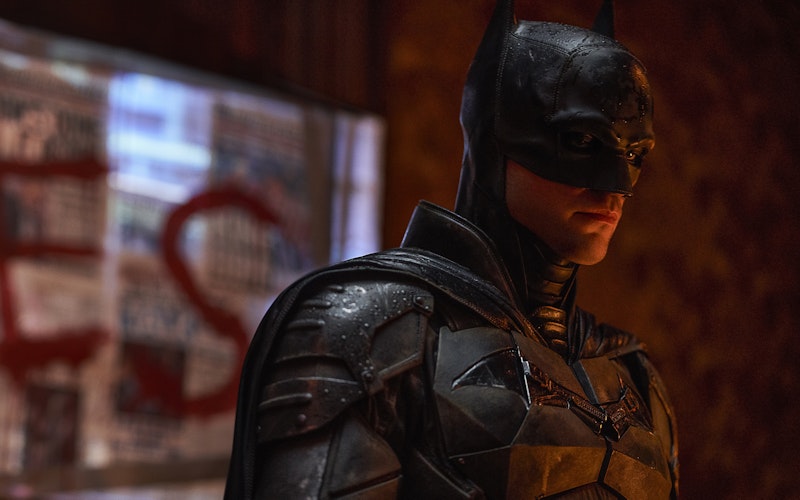
Movies
The Batman: When Vengeance Wears a Mask
Editor’s note: This post contains spoilers for The Batman.
You stand with the belligerent, the surly, and the badly behaved until the bad behavior is recognized for the language it is: the vocabulary of the deeply wounded and of those whose burdens are more than they can bear.
Those are the words of Father Greg, founder of Homeboy Industries, a man of peace who is actively fighting to restore Los Angeles through a gang-intervention, rehabilitation, and reentry program. I thought of how his mission both compares and contrasts to that of Batman while watching the latest movie adaptation of the DC Comics character: The Batman. Historically, Batman has been a hero with a dark past, one who remains incorruptible despite losing his parents to the violence of a corrupt city. Yet in The Batman, his actions often reflect those of a villain trying to achieve peace, as he strikes back at the crime which made him an orphan. Batman is a deeply wounded, complex character. He’s a justice warrior bringing about vengeance with his own hands. But can this bring peace?
This take on the greatest superhero (yes, he’s super even without powers) is dark, both literally and conceptually. Director Matt Reeves, who wrote the screenplay with Peter Craig, invokes realistic crime by showing Gotham as gloomy and gritty. Most of the movie is covered in a dark palette, with rain in many scenes and shadows everywhere. Gotham the gothic. Yet what sets The Batman apart is its ties to the real world. We meet The Riddler (Paul Dano), who leaves clues at crime scenes not unlike the real-life Zodiac killer. In fact, the filmmakers designed one of The Riddler’s cards after one of the Zodiac’s, enhancing the realistic horror element of the film. His costume design is also inspired by an actual sketch of the Zodiac killer.
As Batman, Robert Pattinson is not as fantastical as his comic-book counterpart. He’s only in his second year of crime fighting and in many ways he’s still getting the hang of things. He’s Batman, the world’s greatest detective, who isn’t actually great yet. In many of Batman’s other stories, he struggles between balancing the lives of Batman, the superhero, and Bruce Wayne, the super-rich, yet Pattinson doesn’t spend much time giving us Bruce Wayne. He mainly feels like Batman with his cape off. We even see him in public with his Batman makeup but no suit. He’s slightly more careless than the veteran Batmans who rarely show cracks in their armor. It’s in this developing character that we get the center of a potent theme in the film: vengeance.
TC Podcast: Identity Crisis (The Batman, Insecure)
Batman’s first scene plays out like a horror movie. Pattinson provides a voiceover about the state of Gotham while we witness crime after crime. Eerie music plays, but there is no appearance of Batman at first. It feels as if he’s lurking in the shadows. He doesn’t show up until we meet a gang attacking a civilian. Batman slowly emerges from the shadows and reveals himself in all black—just like a slasher villain would. One of the gang members asks him who he is; after brutally assaulting him, Batman states, “I’m Vengeance!” In Batman’s quest to redeem Gotham, he doesn’t just seek vengeance, he embodies it. The scene even ends with the civilian running away in terror from his would-be savior.
Throughout the movie, Batman is often referred to as “Vengeance,” and we see how this affects the city. Many of the cops don’t trust him, the public hasn’t embraced him, and villains seem to be emboldened by him. There’s a case to be made that Batman actually inspired his antagonist, The Riddler, to become a masked vigilante. In this realistic depiction of a superhero story, real people aren’t “good” tools for vengeance. The vengeance that we seek in our lives usually leads to more chaos than peace. Barbara Deming, an activist for women’s and civil rights, said it this way: “Vengeance is not the point; change is. But the trouble is that in most people’s minds the thought of victory and the thought of punishing the enemy coincide.” Maybe this is why God told us in Deuteronomy that vengeance is his. We don’t pursue it well or justly.
In one of the many closing scenes in the movie (spoilers ahead), Batman’s focus changes from avenging to rescuing. Gotham is in crisis thanks to The Riddler, with flooding in the streets. People have fled to a stadium, which starts to fill with water. Inside, a massive electrical wire hangs over the rising flood, threatening to shock the panicked bystanders below. Batman leaps to the wire, cuts it while getting electrocuted himself, then plummets into the rising tide. When he emerges from the water, he finds a group of trapped civilians and struggles to free them, extending his hand to pull them out. Even so, the first person he approaches hesitates, unsure of his turn from vengeance to assistance.
Sacrifice is Batman’s best tool for bringing peace to his city, not vengeance. This is also the way God intends for us. The sacrificial love Batman shows for the people of Gotham is what wins them over, not a feat of physical strength or the elimination of villains. They are wooed when he lives out this command: “Greater love has no one than this: to lay down one’s life for one’s friends.”
Batman’s final monologue sheds light on his new perspective: “Vengeance won’t change the past, mine or anyone else’s. I have to become more. People need hope, to know someone’s out there for them.” Like Batman, with our faulty human nature, we can't pursue vengeance with a just heart. We will inevitably fail, thus it's our job to love sacrificially and trust God to do the rest, "in due time."
Topics: Movies